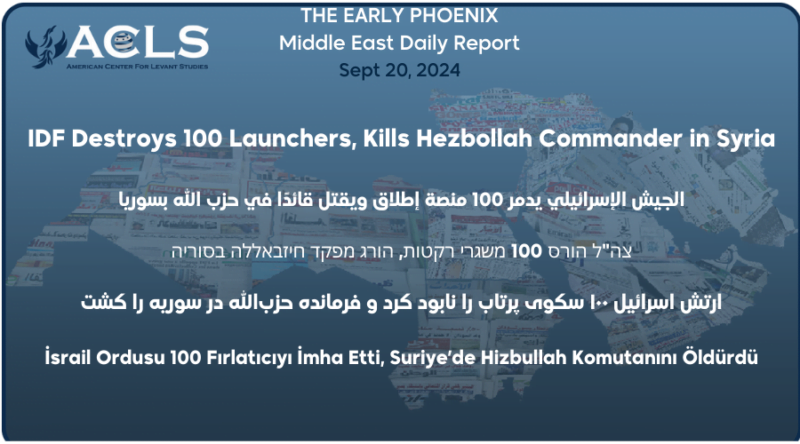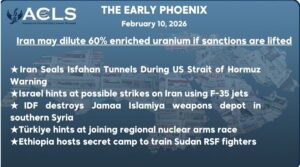
Sept 20, 2024
★ ISRAEL-HEZBOLLAH WAR
-
IDF Destroys 100 Launchers Poised To Fire 1,000 Rockets
On Thursday morning, September 19, Hezbollah launched seven attacks against Israeli targets, resulting in the deaths of a company commander and a Golani soldier. In response, Israeli Air Force fighter jets, guided by intelligence, struck around 30 rocket launchers and military installations. These included approximately 150 launchers, which were poised for immediate firing toward Israel. Lebanese Channels described the situation as a belt of fire with over 80 strikes within twenty minutes. By the end of the day, Israeli forces announced effectively destroying 1,00 rocket launchers poised to fire 1,000 missiles at Israel. During the day, Hezbollah also fired 17 Falaq missiles at Israel’s Metula military site and Katyusha rockets at the Li’man battalion headquarters, doubling their daily average rocket launches. Additionally, several Israelis were injured when a drone from Lebanon crashed in Weshav Yara, while another drone caused a fire in Beit Hillel. Multiple drones were intercepted by the Israeli army.
-
Israeli Jets Break Beirut’s Sound Barrier During Nasrallah’s Speech
Israeli fighter jets were seen flying at a low altitude over the Dahieh area during Nasarallah’s speech. Lebanese media reported that the loud explosions heard over Beirut were caused by the Israeli fighter jets breaking the sound barrier. Hassan Nasrallah condemned Israel for crossing “all red lines”. While he acknowledged the impact of Operation Pagers, he said it was only a setback and not a defeat. Nasrallah said Israel was trying to kill 5,000 Hezbollah operatives within minutes and mentioned that the death toll may rise. He did confirm that his militia remains fully operational and will continue to support Gaza. Nasrallah also challenged Israel’s goal of resettling northern Israelis, vowing to prevent it.
-
Beautiful Italian Linked to Hezbollah Pager Explosions in Lebanon
Cristiana Barsony-Arcidiacono, known as the “Beautiful Italian,” is at the center of investigations into explosive pagers that injured thousands of Hezbollah fighters in Lebanon. Barsony-Arcidiacono, CEO of BAC Consulting, a Hungarian firm, denied producing the devices, claiming her company was only an intermediary in the supply chain. The pagers, originally designed by Taiwan’s Gold Apollo, were reportedly licensed to BAC for distribution. Hungarian officials stated BAC lacks a manufacturing facility, fueling suspicions of a covert operation. Barsony-Arcidiacono’s company also lists environmental and business consulting as part of its operations, adding further mystery. On the other hand, Yossi, whose company Norta Global allegedly arranged the sale of pagers through BAC Consulting, disappeared on the day of the explosions, prompting investigations by Norwegian police. Yossi’s disappearance coincides with an ongoing investigation into whether he was aware of the explosives planted in the pagers. Bulgarian authorities confirmed that while the company Norta Global managed the sale, no pagers were manufactured or exported directly from Bulgaria.
-
Over 50% of Operation Pager Casualties Lose Eyes in Explosion
Dr. Elias Bra, an eye surgery specialist, reported that more than 50% of patients affected by Operation Pagers explosions required removal of one or both eyes. Many also suffered brain injuries, requiring immediate CT scans before surgeries. The explosions occurred close to the victims’ faces, causing severe damage to the eyes. Most patients were in a semi-conscious state, making it difficult to gather details about the incident. The scale of the injuries marked the largest number of eye losses Dr. Bra had ever seen, underscoring the operation’s devastating impact on Hezbollah’s fighters.
-
Hezbollah Struggles To Find Secure Communication
Hezbollah is in crisis after losing three communication systems—mobile phones, wired networks, and “pagers”—since the war with Israel began. Following the destruction of its “pager” system, the group is struggling to find secure alternatives. Communications expert Roland Abi Njeim suggested Hezbollah may resort to underground wired networks, though these are difficult to build and still vulnerable to Israeli infiltration. The situation presents both a technical and trust crisis for Hezbollah, particularly with its equipment suppliers.
=======
★ ISRAEL & PALESTINIAN TERRITORIES
-
Israeli Businessman Admits Iran-Backed Assassination Plot Details
Moti Maman, the Israeli businessman arrested for involvement in an Iranian assassination plot, has now admitted to meeting with Iranian intelligence officials. He revealed that he was tasked with planning attacks on Israeli leaders, including Prime Minister Benjamin Netanyahu, Defense Minister Yoav Galant, and Shin Bet chief Ronen Bar. Maman disclosed that he was instructed to place weapons and money in specific locations across Israel, but demanded $1 million in advance. New details confirm that Maman also discussed targeting dissidents in Europe and the U.S. The investigation continues, with Maman indicted for his role in the plot.
-
Two Suicide Car Bombings In West Bank
Following ex-Hamas chief Khaled Mashaal’s call to revive suicide bombings, two car bombs exploded in the West Bank, with another neutralized near Ramallah. Analysts attribute these operations to Zaher Jabarin, the newly appointed Hamas leader in the West Bank, who took charge after the assassination of his predecessor, Saleh al-Arouri, in Beirut earlier this year.
-
Al-Qassam Targets Three Israeli Armored Personnel Carriers in Rafah
Al-Qassam Brigades released footage showing the targeting of three Israeli armored personnel carriers in Rafah on September 17. One “Namer” carrier was hit with a “Shawaz” explosive, while the other two were struck with “Yassin 105” and “Tandem” rockets. Al-Qassam confirmed trapping an Israeli convoy in a coordinated ambush near the Kuwaiti hospital, destroying the carriers with bombs and rockets.
=======
★ IRAN
-
Iran’s Injured Lebanon Ambassador Transferred to Tehran for Treatment
Iranian media reported that Ambassador Mojtaba Amani, injured in Lebanon while in possession of a Hezbollah-linked pager, was visited by Foreign Minister Abbas Araqchi in a Tehran hospital. Araqchi discussed the incident and recovery plans with Seyed Hassan Ghazizadeh Hashemi, the attending physician and former health minister. Hospital officials also provided updates on the condition of other injured individuals transferred from Lebanon for care. Iranian media reported 30 deaths and over 3,450 injuries, with several of the injured receiving treatment in Iran. Israeli media stated 37 Hezbollah operatives were killed.
===========
★ IRAQ
-
Iraq Increases Security After Lebanon Explosions Involving Communication Devices
Iraqi authorities have tightened monitoring of electronic device imports to prevent any potential security breaches at the borders. This action follows recent explosions in Lebanon that targeted communication devices used by Hezbollah. Major General Yahya Rasool, spokesman for the Commander-in-Chief of the Armed Forces, confirmed that Prime Minister Mohammed Shia’ Al-Sudani led a meeting of the National Security Council to address the latest security challenges. The Iraqi government is focusing on preventing similar incidents within its borders and strengthening national security measures.
-
Iraq Signs Agreement with South Korea to Strengthen Air Defense
Iraq’s Ministry of Defense has signed an agreement with a South Korean company to supply medium-range air defense batteries. Defense Minister Thabet Al-Abbasi said the deal, backed by Prime Minister Mohammed Shia’ Al-Sudani, is a strategic move to enhance Iraq’s airspace protection and maintain regional security. This partnership marks a significant step in boosting Iraq’s defense capabilities and covering critical gaps in air defense infrastructure. The agreement aims to fortify Iraq’s regional standing in military defense.
======
★ SYRIA
-
Israeli Airstrikes Eliminate Iraqi Hezbollah Commander in Syria
At 5 a.m. Syria time, Israeli Air Forces conducted a drone strike on a vehicle near Damascus airport. Hours went by before any details emerged, likely due to Assad media blackout. Sources associated with the Iranian axis reported that the person killed is Abu Haider al-Khafaji, a senior Iraqi Hezbollah commander. The Iraqi Shia militia’s General Secretary of Kataib Syed al-Shuhda’a Brigades sent a message to Nasrallah after Operation Pagers saying “We are waiting for a sign from you to send a stream of Iraqi personnel to the borders of Lebanon and its trenches. If they kill a thousand of you, we will send a hundred thousand.”
-
Assad Regime Bans Wireless Devices, Landlines Are Back
In a classic throwback, the Syrian regime has ordered all security and military units to turn off their wireless devices. This came after multiple explosions in Syria and Lebanon, apparently caused by those very devices. Regime forces and Hezbollah fighters were impacted, with several injured due to exploding radios and pagers. Now, the regime is relying on landlines for communications, hoping this move will prevent further technological mishaps.
-
Fuel Crisis Deepens in Syria as Iran Prioritizes Cash-Paying Customers
Syria’s fuel crisis is worsening with the onset of winter, as gasoline and diesel shortages disrupt transportation nationwide. The Syrian regime’s reliance on delayed Iranian oil shipments—its primary supply source—continues to backfire. Iran, facing global shipping challenges, has prioritized oil exports to cash-paying China over Syria, which depends on credit. The reallocation of tankers to transport Russian oil has further strained Syria’s supply. Assad’s regime scrambles as its long-time ally, Iran, seems more interested in profits than friendship.
========
★ YEMEN
-
Russia’s Plan to Arm Houthis Sparks U.S. Concerns Over Conflict
U.S. envoy Tim Lenderking revealed evidence of Russia’s efforts to arm the Houthi militia, escalating their ties. Lenderking suggested this is a retaliation for U.S. policies on Ukraine, potentially altering the Yemen conflict. Despite Russia’s denial of supplying weapons, covert negotiations between Russia and the Houthis for military equipment have been reported.
-
Blinken Rejects Houthi Terror Designation Despite Escalating Threats
U.S. Secretary of State Antony Blinken recently refused calls to reclassify the Houthi militia as a Foreign Terrorist Organization (FTO), citing concerns over worsening humanitarian conditions in Yemen. This decision comes despite mounting evidence of the Houthis’ destabilizing activities, which include disrupting over 60% of maritime trade, downing U.S. drones, and launching new missile strikes on Israel. While the administration continues to prioritize aid access, critics argue that the delisting has become demonstrably harmful to regional and global security.
=======
★ GULF NATIONS
-
Qatar Airways Bans Pagers and Walkie-Talkies on Lebanon Flights
Qatar Airways has banned transporting pagers and walkie-talkies on flights from Beirut’s Rafic Hariri International Airport. The decision, based on directives from Lebanon’s Civil Aviation Authority, applies to all luggage and cargo. The ban follows explosions in Lebanon involving these devices, killing 32 and injuring over 3,250.
========
★ EGYPT & AFRICA
-
Egypt and Saudi Arabia Strengthen Economic Ties with $33 Billion Trade
Over the past two years, Egypt and Saudi Arabia have achieved a trade volume of $33 billion, reflecting strong historical and economic ties between the two nations. This relationship has become increasingly significant amidst regional instability. Following Saudi Arabia’s $5 billion financial injection, Egypt’s dollar-denominated sovereign bonds have surged to their highest levels in two years, further boosting confidence in the country’s economic outlook. Egyptian companies have also invested approximately $18.6 billion in Saudi Arabia, with 5,700 companies involved. Both nations are finalizing an agreement aimed at protecting and encouraging joint investments, which is expected to further enhance bilateral economic cooperation.
=======
★ TURKIYE
-
Turkiye Calls for Force to Counter Israel’s Regional Actions
Turkish Foreign Minister Hakan Fidan accused Israel of escalating its operations in Lebanon, forcing Iran and Hezbollah to respond. He warned that Israel’s strategy, supported by the West, is aimed at expanding its control from Gaza to Lebanon. Fidan stressed the need for a force to stop Israel’s provocations, calling recent actions “opportunistic.” He also noted Türkiye’s readiness to assist Lebanon following the attacks. The remarks echo Turkish President Erdoğan’s broader calls for restraining Israel.
-
Turkiye to Create Independent Cybersecurity Agency for Digital Protection
Turkiye plans to establish an independent cybersecurity agency to bolster protection against digital threats. Foreign Minister Hakan Fidan emphasized raising cybersecurity awareness within national institutions and highlighted the Ministry of Transport’s role. He noted that Turkiye’s intelligence and police forces already possess advanced capabilities. The ruling AKP has discussed the proposal, which is now under consideration by the National Security Council. The initiative aims to enhance the country’s overall digital defense systems and critical infrastructure.
=========
To receive our next publication into your inbox, subscribe here.
Pager Explosion Cripple Hezbollah, Shoigu In Tehran, Qaani Baghdad



